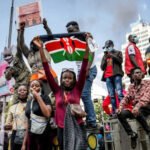A Tanzanian chemical engineer has won the first Africa Prize for Engineering Innovation with his specialised water-filtration system.
Dr Askwar Hilonga’s innovation – a sand-based water filter that cleans contaminated drinking water using nanotechnology – has earned him prize money of UK £25,000 (TZS79 million.)
Each Nanofilter is engineered for a specific body of water and absorbs the contaminants present – from heavy metals or minerals such as copper and fluoride, to biological contaminants like bacteria and viruses, and pollutants such as pesticides.
The United Nations reports that up to 115 people in Africa die every hour from diseases linked to contaminated drinking water and poor sanitation. In a 2014 report, former UN Secretary General Kofi Annan said AIDS, TB, malaria and other infectious diseases would not be defeated until the battle is won for safe drinking water, sanitation and basic healthcare.
After an impressive 33 academic publications, Hilonga’s trademarked Nanofilter is set for commercialisation within a year. It could change the lives of thousands of Africans.
The Africa Prize is an initiative of the UK’s Royal Academy of Engineering. It encourages talented sub-Saharan African engineers from all disciplines to develop solutions to local challenges, and to develop them into businesses.
Launched in 2014, the Prize aims to stimulate, celebrate and reward engineers advancing innovations that will benefit Africans. Dr Hilonga was chosen by the judges following multiple challenging stages of the Africa Prize for Engineering Innovation, during which he competed with entrants from 15 African countries.
Twelve shortlisted Africa Prize entrants from seven countries in sub-Saharan Africa received six months of business training and mentoring where they learned to develop business plans and market their innovations. The group learned to communicate effectively, focus on customers and approach investors.
At the awards ceremony in Cape Town on Monday 1 June, the four finalists gave their final presentations, after which the Africa Prize judges and a live audience voted for the most promising engineering innovation from sub-Saharan Africa.
The three runners up, who each win £10,000, were all commended for the potential of their innovations:
- Ernst Pretorius from South Africa for a fence-mounted security system
- Musenga Silwawa and team from Zambia for his spot fertiliser applicator
- Samuel Wangui and team from Kenya for Chura, a SIM-card-swapping service.
‘We are proud to have Tanzania’s Dr Askwar Hilonga as our first Africa Prize winner,’ said head judge Malcolm Brinded CBE FREng. ‘His innovation could change the lives of many Africans, and people all over the world. He has successfully incorporated the training and mentoring from the last six months into his business plan, and shows great promise.’
Dr Hilonga is a chemical engineer and lecturer at the Nelson Mandela African Institution of Science and Technology. Described by the institution as a ‘very prolific young Tanzanian chemical engineer,’ his aim is to inspire Africans to empower their own communities.
‘Thanks to step-by-step guidance and support from my mentors in the Africa Prize, I was able to approach funders,’ said Dr Hilonga. ‘The many insights gained from my training are opening doors for the project’.
The Royal Academy of Engineering has already announced the opening of the second Africa Prize for Engineering Innovation. Individuals and small teams living and working in sub-Saharan Africa, and who have an engineering innovation, are invited to enter.
Potential entrants can find more information here
The Africa Prize is supported by the Shell Centenary Scholarship Fund, Consolidated Contractors Company, ConocoPhillips and the Mo Ibrahim Foundation.
The eight other shortlisted innovators from the first Africa Prize for Engineering Innovation also received six months of mentorship and training. Their innovations are:
- Ayodele Adigun and team from Nigeria, with a mobile application for merchants and customers to make and receive card payments through their phones and tablets.
- Captain Abubakar Imam from Nigeria, with a removable burglar-bar system for emergency exits from buildings.
- Dr Oscar Kibazohi and team from Tanzania, with a process for the mechanical pressing of bananas to produce enzyme-free clear banana juice.
- Dr Reinhardt Kotzé and team from South Africa, who developed an industrial process and quality-control system for the fluids-manufacturing industry
- Samuel Malinga and team from Uganda, with a full-cycle sanitation service to reduce pollution to the environment and prevent diarrheal disease.
- Rujeko Masike and team from Zimbabwe, with a portable crushing machines for small and medium size mining operations.
- Ian Mutamiri and team from Zimbabwe, with a mobile device application that teaches children how to read Shona.
- Justin Nwaogwugwu from Nigeria, with an affordable multi-purpose degreaser/cleaner.
Source: Cape Business News






